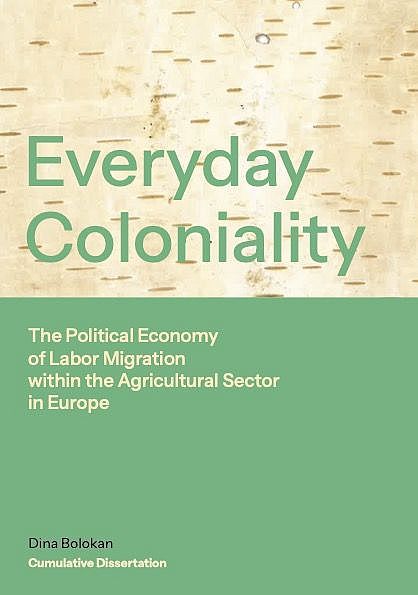Everyday Coloniality
The Political Economy of Labor Migration within the Agricultural Sector in Europe
Dina Bolokan
We tend to forget that the lowest proletariat in a colonizing country
always has a sub-proletariat from the colonized country,
and this reality outlasts colonization.
— Chris Marker (in “Le Joli Mai” 1962)
This cumulative dissertation investigates the political economy of labor mobility and migration in the agricultural and agrifood sector in Europe. It does so by examining the labor conditions of the most mobile and precarious workers from Moldova that work in Switzerland and across various countries in the European Union. It also examines the involved policies that regulate rotation and recruitment. The trans-regional research design weaves together global ethnography, a life-course perspective, and post- and decolonial approaches to account for how entangled histories impact the life of agricultural workers and their communities.
Drawing on the lives of agricultural workers from Moldova and their ways of entering the European labor market, I examine how hypermobility—a rotational regime characterized by short-term and constantly changing work arrangements—affects workers' health and general well-being. In addition, I describe a phenomenon that is crucial but has been overlooked: the existence of subsistence chains. Based on these insights, I situate the observed living and working conditions, such as macro policies, tracing the logic of their inherent political economy and elaborating on the larger historical entanglements of underclassing. I argue that colonial legacies are immanent in hypermobility, and the larger differentiated regimes of im_mobilization, mirrored in such policies as Circular Migration. This is due to the way in which this division of (re)productive labor and these regimes developed in terms of the composition of the workforce, its racializing/ethnicizing qualities, and, above all, the subaltern position of the workers within the local and global economy. Furthermore, the analysis of the recruitment infrastructure shows how agricultural labor recruiters in state-funded institutions in Switzerland draw on a white colonial culture—the plantation archive—to reinforce neocolonial power relations in everyday life on farms. Tracing the ways in which an ethnicized/racialized, gendered, and dehumanized underclass in agriculture is justified in everyday micro-politics, I argue, that it is nurtured by colonial fantasies and postcolonial masculinities.
By proposing Everyday Coloniality as an empirical and epistemological framework for the study of living and working relations, this dissertation contributes to the development of a theoretical and methodological framework for the study of processes of underclassing in Europe from an intersectional perspectives and by using the post-, decolonial and post-Soviet lenses. In doing so, it advances a concept for capturing the invisible economy of food production and understanding neocolonial conditions through cultural and sociological analysis at the macro-, meso- and micro-structural levels. In doing so, the Everyday Coloniality framework seeks to reconcile the divide that separates the study of (feminist) political economy from postcolonial studies.
This cumulative dissertation was supervised by Andrea Maihofer (University of Basel) and Patricia Purtschert (University of Bern).
This thesis was awarded the Dissertation Prize 2025 by the Migration and Ethnic Minorities Section of the German Sociological Association.

zu den Publikationen
- Labor Recruitment and Coloniality in the Agricultural Sector: On Plantation Archives, Underclassing, and Postcolonial Masculinities in Switzerland
- Agricultural Labour Regimes of Im_Mobilisation. On the Legacies of Internal and External Colonisation within Europe
- On the Hypermobility of Agricultural Workers in Europe: Life Courses Between Rural Moldova and Switzerland/the EU
- Against Single Stories of ‘Left Behind’ and ‘Triple Win’: On Agricultural Care Chains and the Permanent Subsistence Crisis
- Recruitment infrastructure within the agricultural and agrifood sector: Post-Soviet and neocolonial entanglements between “Eastern” and “Western” Europe.
Quick Links
Social Media
